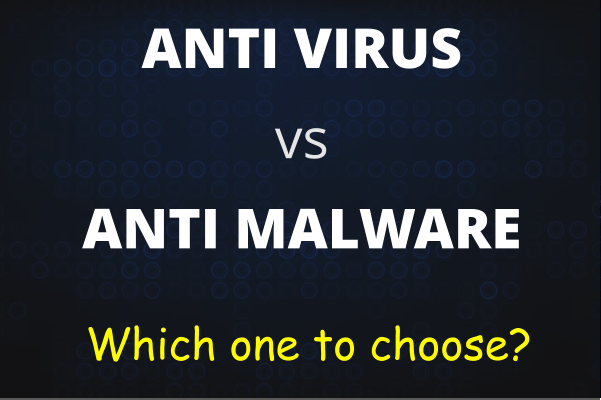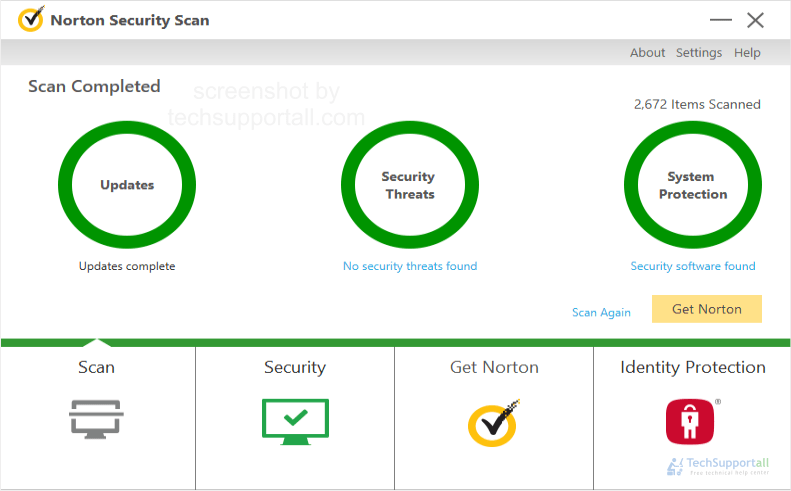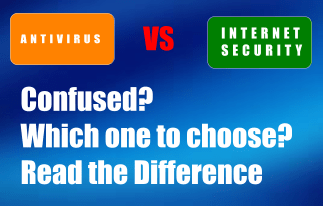Are you confused between antivirus and antimalware software? Then this post can help you solve this problem. Let’s find out how these two types of software are different. And which one should you choose?

Understanding Antivirus and Antimalware software
To understand antivirus and antimalware, we must first understand viruses vs malware. Because these software programs are designed to protect against viruses and malware, understanding these two terms will give you an exact idea of what antivirus and antimalware are.
Actually, Malware is anything malicious which affects the normal functionality of the computer. And Virus is a kind of malware which spreads from one program to another.
Virus vs Malware
Virus is the first kind of malware emerged in 90s. So term virus and antivirus get more popular. New kind of malware increased after 2010 and now term malware and anti-malware are used widely.
A virus is a kind of malware. So, malware is a broad term that includes all types of malicious software. But in the initial days, antivirus software became popular to eliminate all kinds of threats. In modern times, cyber criminals develop new kinds of malware that are not easily caught by traditional antivirus software. In this context, some cyber security experts have developed new behavioral-based technology to detect previously unknown types of malware. And they named this software “antimalware.”
Difference between Antivirus and Antimalware software
| Antivirus | Antimalware |
|---|---|
| Uses signature technology to catch the threats | Uses behavioral technology to detect the threats |
| Can only catch known type of virus | Can also catch unknown type of malware |
| All next gen antivirus includes antimalware module | Some of them uses cloud based virus scanning |
| Mostly antivirus conflict with other installed antivirus software | They do not conflict with other antivirus or antimalware software |
| Usually comes with full protection suite including firewall and antimalware | They usually designed to complement the Antivirus Software and does not include virus definitions and firewall |
| Examples are : Norton, McAfee | Examples are : Malwarebytes, Zemana |
| List of Best Antivirus software | List of Best Antimalware software |
While anti-virus and anti-malware look similar to protect the computer from malicious activities, they have different methodologies and expertise to do this.
Antivirus usually deals with the older, more established threats, such as Trojans, viruses, and worms. On the other hand, anti-malware usually focuses on threats that are more recent, like polymorphic malware and malware that is spread through zero-day exploits.
Unlike viruses, malware is dynamic in nature. In the 90s, viruses were a force to reckon with. As a result, viruses became the most dreaded form of malware. Advancement in computer knowledge has brought about solutions to almost all virus attacks. An antivirus protects your computer against malicious software that may be transferred from the internet or through flash drives. Antivirus will detect such program files before they replicate and eliminate them completely. An antimalware, on the other hand, does pretty much the same thing, although it is more focused on new forms of malware. Basically, anti-malware uses behavioral technology to detect unknown threats.
Antivirus is more efficient in dealing with viruses, trojans, and other forms of already known malware. An anti-malware is more effective in dealing with unknown threats.
An anti-malware program will remain running on your computer every minute. It scans the files used by the computer and removes any file found suspicious or harmful. What makes an anti-malware different from an antivirus is that the definition of a malicious file for an anti-malware changes more often. In most cases, an anti-malware needs to remain connected to the internet to keep updating itself.
Are antivirus and antimalware the same?
Technology wise they both are different, but as a software they are almost doing the same task. Initially, these two pieces of software used different technologies. But now, both software programs have adapted to each other’s technologies. So, with a few exceptions, both programs do almost the same things in the modern world.
Initially, computer viruses (a type of malware) were the major threat, so the term “antivirus” was widely used. Other types of threats play a larger role in modern times than viruses, so the term “antimalware” is gaining popularity.
These days, all antivirus programs are named “antivirus,” but they all include the antimalware capability with behavioral technology. Mostly Antimalware uses a cloud-based multi-antivirus engine to scan for viruses and gets the advantage of traditional virus definitions. It also gives them more power over single engine scanning.
Antimalware vs antivirus
Antivirus software is now integrating the antimalware module, and antimalware is integrating the antivirus scanning engine. So they are doing almost the same task. But check and compare the features carefully, as all of them are not created equally.
Conclusion : which one should you choose?
The question is worth asking as people get confused between these two kinds of software, whereas their work looks almost identical. Modern cyber security threats are emerging very fast, and new kinds of methods are invented daily by bad coders. So here are your choices
If you are using a free antivirus or antimalware, you must use the multiple layers to maximize the security. And if you are using a single antivirus product, then make sure that it has antimalware capability and has multiple layers of security. The links below can be useful for you to choose the right security software for you.
My Personal experience and suggestion
I recommend you to use one antimalware and one antivirus product in combination to keep you protected from all possible threats. As I am using on my Laptop Norton 360 + Hitman Pro Alert + Malwarebytes. And this combination is very effective and is also light on system resources.
I chose Norton Security because it has strong virus definitions and antimalware, a smart firewall, community insight, and tamper protection.
I chose Hitman Pro as it has features like keyboard input encryption, Webcam protection, USB protection, and Crypto Protection to protect against ransomware. It also uses behavioral cloud-based technology to scan the suspected file with other 3 antivirus engines to detect any possible threat.
I chose Malwarebytes Pro as it has strong web protection with a database of malicious URLs. It protects against bad urls, malicious advertising urls, etc. along with its strong antimalware capabilities.
This is the best combination of antivirus and antimalware that gives me full-proof protection from mostly all kinds of threats, and I am able to surf the internet without any fear or restriction. Please share your thoughts about this and also suggest the best combination as per your experience.
You can also use an antimalware software as a second opinion scanner to maximize the security.

